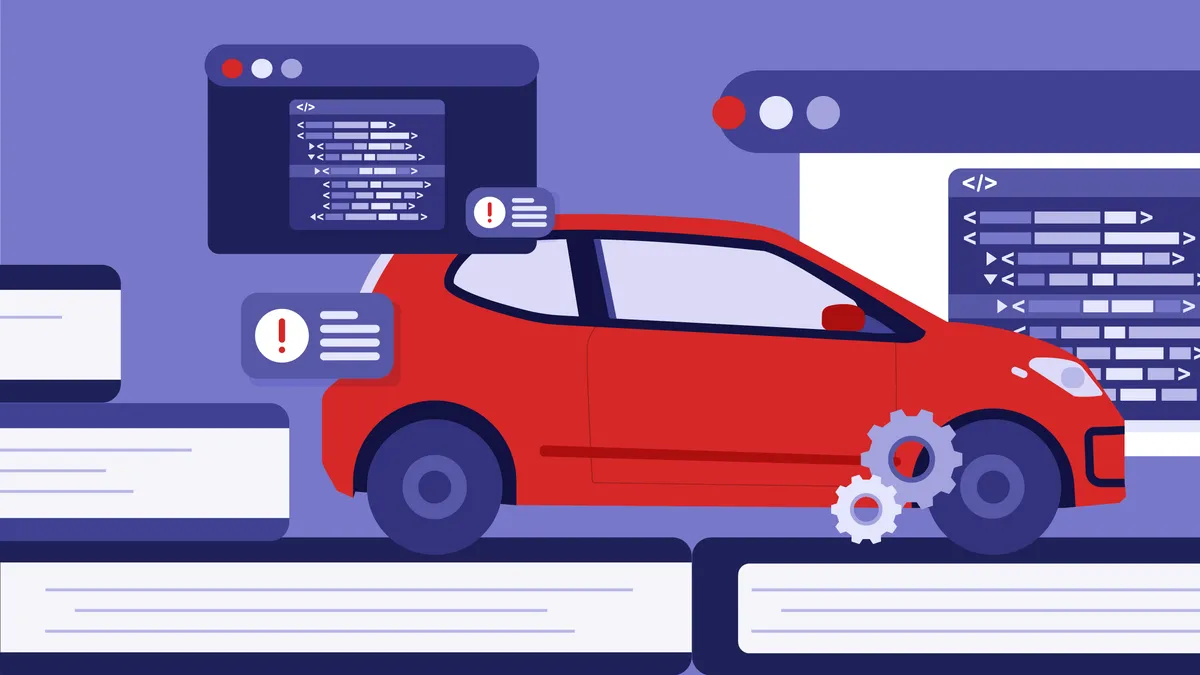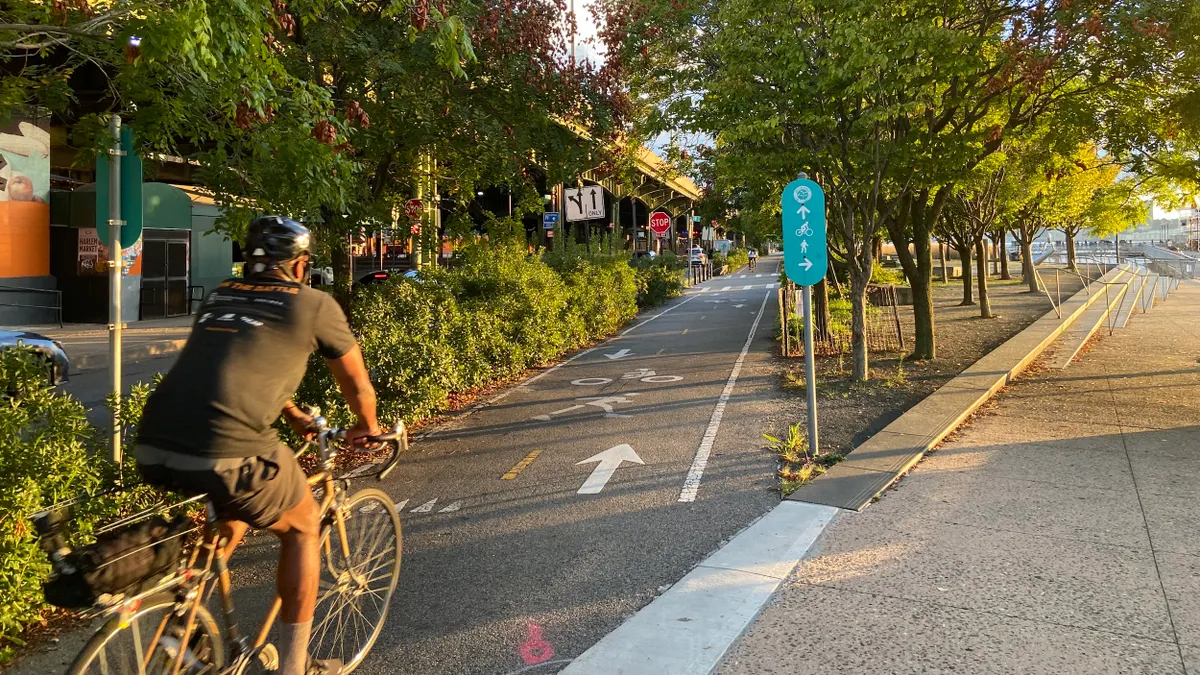When the Center for Automotive Research (CAR) at Ohio State University began over 30 years ago, it focused on traditional subjects like the transmissions, noise and vibrations from internal combustion engines, with some attention paid to what was then a growing trend of automotive electronics.
Now, with the advent of autonomous vehicles (AVs), its focus has changed.
"What used to be a predominantly mechanical engineering discipline with some electronics sprinkled in has become an industry that depends on computing power, computer science, electrical and electronic systems and electrochemical energy storage," Giorgio Rizzoni, CAR's director and an OSU mechanical and aerospace engineering professor, said.
The growing emphasis on AVs comes as experts warn of a lack of qualified AV engineers. The dearth of expertise could hamstring the rollout of this much-hyped technology.
"You would think that people would be lining up to work in this area," said Frank Menchaca, chief growth officer at standards-developing organization SAE International. "But the truth is, there is a relatively small pipeline of people who are equipped to be successful in automated driving."
To combat that talent gap and grow the workforce of the future, four-year colleges and universities as well as community colleges and industry groups are starting to offer courses in AV engineering, software development and cybersecurity, with the help of industry experts to develop the curricula.
As the AV industry is estimated to skyrocket to a value of $556.67 billion by 2026 — from $54.23 billion in 2019, according to Allied Market Research — industry leaders warn such programs are imperative to ensure that graduates' skills keep pace with the industry's rapid rollout.
Evolving education needs
AV education in the academic setting focuses largely on engineering and software development, with automakers and other industry leaders often playing a key role in helping shape programs for students.
CAR is Ohio State's main research lab for connected and autonomous driving. Among its projects is the EcoCAR, in which student teams compete over four years to re-engineer a Chevrolet Blazer to incorporate AV and electric technologies.
Graduate students also have the opportunity to work alongside some of the manufacturers in the Columbus, Ohio, region, and their thesis projects typically are funded by automakers, Rizzoni said.
"You would think that people would be lining up to work in this area. But the truth is, there is a relatively small pipeline of people who are equipped to be successful in automated driving."

Frank Menchaca
Chief Growth Officer, SAE International
The program's teaching focuses on the trend of automation and intelligence in vehicle technology in addition to energy efficiency and reducing carbon emissions. Industry needs and the evolution of driving technology are largely driving that curriculum, Rizzoni said.
"If you were to ask the vice president for research at Ford Motor Company, for example, 'Where's Ford going?' They would tell you: 'More intelligent mobility, different solutions that involve understanding and analyzing data and responding to it in real time,'" Rizzoni said. "In that sense, we think that our future is where the future of the automotive industry is."
The College of Charleston is launching a new electrical engineering degree program this fall with a focus on AVs. The initiative will complement its existing systems engineering degree while teaching students how to connect cars with various sensors, design their movements and operate the vehicles autonomously.
Sebastian van Delden, dean of the college's School of Sciences and Mathematics, said the needs of automakers in the region are driving its offerings as well. Like students at Ohio State, senior students at Charleston will work on a yearlong capstone project alongside Mercedes, Volvo and Bosch, which each have factories in South Carolina.
The degrees can also help graduates who don’t end up working directly with AVs, van Delden said. "Nowadays in factories and other settings, they need people who can wire up, connect and program a variety of [internet of things] devices to implement, design and plan some type of system," he said. "Graduates will be very good candidates for those types of positions."
Democratizing job opportunities
Some community colleges and other groups are also getting in on the act.
Pima Community College in Tucson, Arizona, launched the first-ever autonomous driving certificate program for truck drivers in 2019, in partnership with self-driving truck company TuSimple.
The 12-credit program teaches students to operate and work with self-driving trucks while building skills in areas such as logistics, IT and automated industrial technology. The program's introductory class provides a wide view of the AV landscape, including the ethical issues that surround it, like how AVs prioritize lives in a collision.
Missy Blair, advanced program manager at Pima's Center for Transportation Training, said about a dozen students are enrolled in the program right now. The program's first students graduated last fall and are in the hiring process at TuSimple, which prioritizes hiring the center's graduates.
Other education and training providers — beyond academic institutions — also are looking at how they can enter this field to educate people on AVs.
Online course provider Coursera in 2019 announced it had partnered with the University of Toronto on a $79-a-month course that will include lessons on AV technologies that include LiDAR, software, motion planning, intersection management and safety. The group says it already has had more than 46,000 enrollees.
SAE International also recently unveiled a boot camp course on robotics for AV systems, a 12-week program designed to halve the average eight-month onboarding time for new engineers at automakers, Menchaca said. The course uses hands-on learning to teach participants to program a mobile robot and teaches various pieces of software engineering, including machine learning, path planning and visual intelligence.
"We want to democratize access to those jobs," Menchaca said. "We want to work with students that are coming out of all sorts of programs."
Innovation and differentiation
While academic AV programs are still relatively young, institutions are adding their own differentiators to attract to prospective students.
Cybersecurity, for example, has taken on heightened importance, as automakers, cities and academics become increasingly concerned about AV vulnerabilities. George Mason University (GMU) in Fairfax, Virginia, has provided cybersecurity training and research for several decades, including training for AVs and infrastructure.
With that expertise, the university created a cybersecurity engineering degree, the first such accredited program in the country — which now has 500 undergraduate students enrolled in it — and an accelerated master’s degree program.
Duminda Wijesekera, a professor of computer science at GMU's Volgenau School of Engineering, said the program comes as automakers and technology firms are concerned about vulnerabilities in their offerings and want to find graduates who can help solve them.
"They want software skills, they want cybersecurity skills, they want people who understand data fusion," he said. "These are very difficult to find in the workforce right now. Our objective is to train this new workforce that are cross trained in an engineering discipline, and also in programming."
Mason hopes to boost those efforts with the launch of its Mason Innovation Lab, a central hub for its labs and other technology, where "more diverse experimentations" can be done, Wijesekera said.
The College of Charleston requires engineering students to study a foreign language for four semesters.
Van Delden said students may gravitate towards German given the country's role in auto manufacturing. The language requirement will help prepare students to be part of an international workforce, he said.
"We're going to give them all the technical stuff, the physics and the math and engineering, but we want an engineer who can think about how to solve those problems within the broader global, societal, cultural and ethical parameters, and the world around us," van Delden said.
AV students at the College of Charleston can also study abroad, something of a rarity in engineering programs due to the number of courses required for study. Students can spend a semester of their sophomore year at either the National University of Ireland or Heriot-Watt University in Scotland.
Impact on the workforce
These academic offerings come as elected officials and others continue to raise concerns about the impacts of AVs on the labor force — most notably, whether they will automate some workers out of a job.
At a 2018 event in Washington, D.C., U.S. Sen. Gary Peters, D-Mich., warned that artificial intelligence and other technology to automate trucks could risk a "hollowing out of the middle class." He also warned that trucking "is where we're going to see some of the earliest application of this technology," which could negatively impact the nation’s 3 million truckers.
Peters and others repeated those concerns in the nomination hearing for Transportation Secretary Pete Buttigieg before the U.S. Senate Committee on Commerce, Science and Transportation in January. Buttigieg noted that among emerging technologies, policy has not kept up with innovation, including on workforce development.
Blair, with Pima Community College, said a crucial goal of its course is to help raise public awareness of AVs and help truckers understand that trucking and haulage jobs may change but will never truly disappear.
"Basically, the main message is that while the job isn't going away, it will change."

Missy Blair
Advanced Program Manager, Center for Transportation Training, Pima Community College
"Basically, the main message is that while the job isn't going away, it will change," she said.
The close relationships between automakers and academia on these courses could put students in good stead for their future employment prospects, too. Mercedes and Volvo have a manufacturing presence in South Carolina and have representatives on the College of Charleston's industrial advisory board, and BMW also has a factory in the state.
TuSimple has its main testing facility in Tucson, while Honda has invested in CAR since its launch and has a manufacturing operation close by in Ohio. That local presence helps create a pipeline of local graduates to jobs with those nearby manufacturers.
"A big thing we're trying to accomplish with engineering, just like we've done with computer science here, is really support local economic development," van Delden said. "You have all these big companies now in town, and we want them to hire locally. So why not produce the graduates they need, who can more easily get internships and jobs, because they're here with the companies in town."
With the automotive sector continuing to innovate and become even more focused on technology, Rizzoni said it is imperative for academia to continue to prepare students for that future.
"Our role is to create the next generation of automotive industry leaders and that the next generations will be different than the past generations," he said. "Our mission is to make sure that we prepare them well and that they're ready for the sea of change that is in front of us."



















